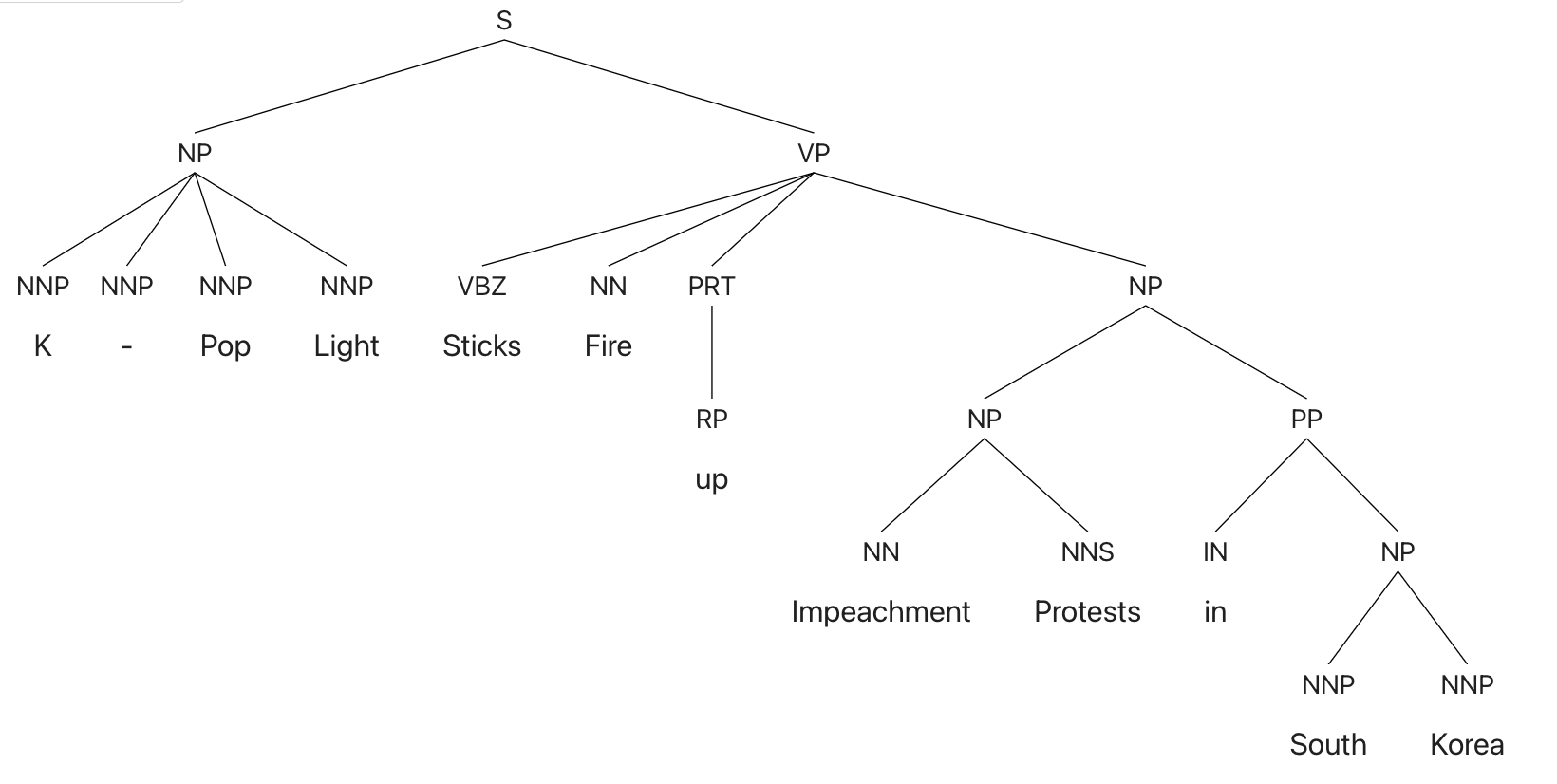Who stuck fire up where?
« previous post | next post »
That seems to be reader RBM's reaction to the headline "K-Pop Light Sticks Fire up Impeachment Protests in South Korea", Reuters 12/10/2024.
For whatever reason — maybe the picture at the top of the story — I understood the headline immediately. But the Berkeley Neural Parser makes the same mistake as RBM:
Spacy's analysis of the headline text is distinctly weirder, analyzing the whole thing as an implausible compound noun construction:
Dep tree Token Dep type Lemma Part of Sp
───────── ─────────── ──────── ─────────── ──────────
┌──► K compound K PROPN
│┌─► - punct - PUNCT
┌─►└┴── Pop compound Pop PROPN
│ ┌──► Light compound Light PROPN
│ │┌─► Sticks compound Sticks PROPN
└──┴┼── Fire ROOT Fire PROPN
└─► up prep up ADP
┌─► Impeachment compound Impeachment PROPN
┌─────┴── Protests ROOT Protests PROPN
└─►┌───── in prep in ADP
│ ┌─► South compound South PROPN
└─►└── Korea pobj Korea PROPN
This weirdness seems to have been caused by treating the word-initial capitals as reliable indications of proper nouns, because with capitalization limited to "K-Pop" and "South Korea", Spacy gets it right:
Dep tree Token Dep type Lemma Part of Sp
──────────── ─────────── ──────── ─────────── ──────────
┌──► K compound K PROPN
│┌─► - punct - PUNCT
┌─►└┴── Pop nsubj Pop PROPN
│ ┌─► light amod light ADJ
┌─►└───┴── sticks nsubj stick NOUN
┌─┴──────┬── fire ROOT fire VERB
│ └─► up prt up ADP
│ ┌─► impeachment compound impeachment NOUN
└─►┌─────┴── protests dobj protest NOUN
└─►┌───── in prep in ADP
│ ┌─► South compound South PROPN
└─►└── Korea pobj Korea PROPN
Asked to explain the headline, ChatGPT simply summarizes (and links to) the Reuters story:


Philip Taylor said,
December 10, 2024 @ 10:54 am
Assuming (I have not checked) that the correct interpretation is "K-Pop light-sticks fire up impeachment protests in South Korea", then does the problem not simply lie in the omission of the hyphen ?
[(myl) What hyphen? The one that hardly anyone hardly ever uses?]
GH said,
December 10, 2024 @ 11:03 am
There's also a question of how to parse the article in the Korean Constitution that authorizes the President to declare martial law. In (unofficial) English translation:
Source: https://elaw.klri.re.kr/eng_service/lawView.do?lang=ENG&hseq=1
Is this to be read as "When it is required (to cope with a military necessity) or (to maintain the public safety and order by mobilization of the military forces in time of war, armed conflict or similar national emergency), the President may proclaim martial law under the conditions as prescribed by Act"?
Or as "When it is required (to cope with a military necessity or to maintain the public safety and order) by mobilization of the military forces (in time of war, armed conflict or similar national emergency), the President may proclaim martial law under the conditions as prescribed by Act"?
(Other structures are of course also possible.)
The first reading would seem to grant the President more leeway, as it makes an undefined "military necessity" sufficient grounds, while the second reading would always require "time of war, armed conflict or similar national emergency" as a precondition.
I have no idea whether this apparent ambiguity is present in the Korean text.
JChance4d4 said,
December 10, 2024 @ 12:50 pm
This was me, and I saw it on a search, without picture. That, and lighting a fire under someone is a common expression for me, that probably gave a similar phrase more believability for a second or two,
Yves Rehbein said,
December 10, 2024 @ 2:02 pm
@ GH, nevermind the unofficial translation. First you should ask if constitutional law is always literal.
Besides, I can tell without reading Korean that the intended meaning is "emergency". My reasoning is entirely unsound. Necessity is synonym to need, the latter is related to German Not, which can mean emergency, and naudiz as name of the n-rune by the way. Notfall "case of emergency" and similar terms behave somewhat like Greek strepho "to twist" (katastrophe) and Latin cado "to fall" (accident, incident, casus). Since English lost case inflection, you have to make do with "case of emergency" or an adjective like needful.
It is remarkable that Sino-Korean bisangsatae 非常事態 "state of emergency" comes with 非 "NOT", apparently via Sino-Japanese 非常. The meaning most relevant to the question seems to be literary Chinese cháng "law and order". There is no obvious translation for the meaning implied by necessity "negation of freedom in voluntary action" (Wiktionary), which meaning is confirmed by the legal doctrine of German Notwehr. It is hilarious that Zh bìyào 必要, Ko piryo, Ja hitsu "necessity" agrees with the *p onset of 非 from the negation particle 不, yet the etymology is uncertain. (All according to Wiktionary).
The original text apud Wikisource.
https://ko.m.wikisource.org/wiki/%EB%8C%80%ED%95%9C%EB%AF%BC%EA%B5%AD%ED%97%8C%EB%B2%95_(%EC%A0%9C10%ED%98%B8)
Cf. 국가비상사태에 guggabisangsataee "In a state of national emergency" and 필요에 pil-yoe "in need". (Google translate).
Rod Johnson said,
December 10, 2024 @ 2:13 pm
Yves Rehbein, I congratulate (?) you on your use of apud. Is this the most obscure preposition in English? (Possibly anent is in the running.)
David Morris said,
December 10, 2024 @ 2:30 pm
On my screen, the first paragraph appears with the line break after 'Fire', possibly favouring the unintended meaning by separating 'Fire' and "up'.
I saw the same story on the Korea Times site. Its headline is the less ambiguous 'K-pop light sticks become new candle lights for Korean democracy'. (I would possible say 'candles' rather than 'candle light's.)
J.W. Brewer said,
December 10, 2024 @ 4:12 pm
Glossing "necessity" as "negation of freedom in voluntary action" is a little too freshman-philosophy-class for a legal context, at least in English. "Necessity" as a justification for or defense of otherwise impermissible action, whether in a criminal or civil context, is typically a bit looser than that, although not too loose (perhaps easy to invoke, but hard to invoke successfully). I can imagine contexts where the two-word phrase "military necessity" would be viewed even more loosely, because of the reluctance of civilian judges to second-guess military commanders about how necessary such-and-such extreme measure may be under wartime conditions. More skepticism toward a claim of military necessity might however be present in peacetime, or even, as in Korea, over 70 years after the armistice in a war that has perhaps never technically fully ended.
Jonathan Smith said,
December 10, 2024 @ 5:10 pm
PepsiCo: "Do the Dew, the X-treme Dew"
Laozi: "[One may] dō the dō, the X-treme dō" 道可道非常道
KWillets said,
December 10, 2024 @ 5:43 pm
@GH the modifier phrase attaches to the subject more like:
The president in wartime, an incident of armed conflict, or similar national emergency …
I am not 100% certain, but it seems to apply to both cases. I believe there is some debate over how this statute was interpreted. Yoon seems to have pushed the "similar national emergency" narrative, which suggests that he believes it to be a required precondition.
Viseguy said,
December 10, 2024 @ 5:44 pm
@Rod Johnson: @Yves Rehbein's apud jumped out at me too. As a pre-Vatican II altar boy, I learned this preposition years before I studied Latin formally in high school. It appears twice in the opening verses of the Gospel according to John (apud Jerome): "In principio erat Verbum, et Verbum erat apud Deum, et Verbum erat Deum, hoc erat in principio apud Deum…." (Sadly, the practice of reciting this sublime text at the end of the Mass, after the dismissal, was retired after the Council, along with the Latin Mass itself. There's much, I feel, to admire much about Francis's papacy, but I think his overreactive deprecation of the Tridentine Mass was/is a mistake. But I digress … but before I stop digressing, I'm wondering whether @J.W. Brewer can shed light on whether there's any proximate etymological link between Jerome's apud and John's original πρὸς….) What I actually mean to say, though, is that I don't think that apud is generally recognized as an English borrowing — based on a quick look at OED and RHUD.
Peter Taylor said,
December 10, 2024 @ 6:26 pm
Spacy gets the right structure, but I don't think it's right to analyse light as ADJ: it's surely a noun in a noun-noun phrase: sticks which emit light rather than sticks which aren't heavy. In fairness, I suspect that such subtleties are more than it is intended to handle.
Andrew Usher said,
December 11, 2024 @ 8:51 am
Indeed, if it were an adjective, then writing it hyphenated or solid would be forbidden, yet light-stick is clearly not wrong, and lightstick (the only spelling in Wiktionary) even less.
Benjamin E. Orsatti said,
December 11, 2024 @ 9:21 am
Viseguy,
I feel your pain (having, myself, been married in a Tridentine Mass). I've often wondered, too, why the otherwise kindly and avuncular Papa Francesco would come down so hard on the Latin Mass crowd, but I read an article this morning (https://www.catholicculture.org/commentary/is-pope-francis-fighting-youthful-battles-all-over-again/) that made a lot of sense — the thesis is, essentially, that he's still fighting the battles that were being fought when he was coming of age in the Church, during the '50's and '60's. The author sums up his thesis:
Anent "apud", I'd like to make the case for preserving it in the English lexicon because we don't, presently, have a word that invokes the same shades of "at, by, near, among, in the presence of, before", "apud" being far more productive for lectio divina of "et Verbum erat apud Deum, et Verbum erat Deum", than "with".
J.W. Brewer said,
December 11, 2024 @ 11:31 am
@VIseguy: How Jerome Latinized NT Greek is not a particular expertise of mine (flattered though I am that you might suppose otherwise) and no doubt there are actually qualified classicists lurking here, but here's how Wycliffe et al. handled Jerome's "apud" in that verse back in the 1380's: They Englished it as "at." "In þe bigynnynge was þe word, [þat is, Goddis ſone,] and þe word was at God, and God was þe word." (I put brackets around what the translators must have intended as an explanatory interpolation.)
At least one earlier translator into Old English used "mid" (cognate with German "mit") for "apud": "On anginne ærest wæs word. & þæt word wæs mid gode. & god wæs þt word." This from the MS conventionally called the "Wessex Gospels."
Yves Rehbein said,
December 13, 2024 @ 7:14 pm
I am so sorry if I worded that in a way too confusing for American ears. What I meant to say:
K-Constitution light, by Wikipedia ™, brought to you by all means necessary.